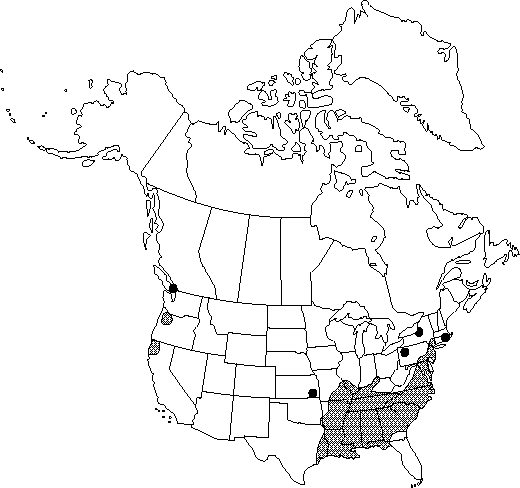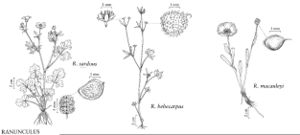Difference between revisions of "Ranunculus sardous"
Stirp. Austr. Fasc. 2: 84. 1763.
FNA>Volume Importer |
FNA>Volume Importer |
||
| Line 19: | Line 19: | ||
|basionyms= | |basionyms= | ||
|synonyms={{Treatment/ID/Synonym | |synonyms={{Treatment/ID/Synonym | ||
| − | |name= | + | |name=Ranunculus parvulus |
|authority=Linnaeus | |authority=Linnaeus | ||
}} | }} | ||
| Line 36: | Line 36: | ||
|elevation=0-200 m | |elevation=0-200 m | ||
|distribution=B.C.;Ala.;Ark.;Calif.;Fla.;Ga.;Ill.;Kans.;Ky.;La.;Md.;Miss.;Mo.;N.J.;N.Y.;N.C.;Okla.;Oreg.;Pa.;R.I.;S.C.;Tenn.;Tex.;Va.;native to Europe;Pacific Islands;Australia. | |distribution=B.C.;Ala.;Ark.;Calif.;Fla.;Ga.;Ill.;Kans.;Ky.;La.;Md.;Miss.;Mo.;N.J.;N.Y.;N.C.;Okla.;Oreg.;Pa.;R.I.;S.C.;Tenn.;Tex.;Va.;native to Europe;Pacific Islands;Australia. | ||
| − | |discussion=<p>Ranunculus sardous was collected in New Brunswick and Ontario in the 1800s, but it apparently has not persisted in those provinces.</p> | + | |discussion=<p><i>Ranunculus sardous</i> was collected in New Brunswick and Ontario in the 1800s, but it apparently has not persisted in those provinces.</p> |
|tables= | |tables= | ||
|references= | |references= | ||
| Line 49: | Line 49: | ||
|rank=species | |rank=species | ||
|parent rank=section | |parent rank=section | ||
| − | |synonyms= | + | |synonyms=Ranunculus parvulus |
|basionyms= | |basionyms= | ||
|family=Ranunculaceae | |family=Ranunculaceae | ||
| Line 61: | Line 61: | ||
|publication year=1763 | |publication year=1763 | ||
|special status=Selected by author to be illustrated;Weedy;Introduced | |special status=Selected by author to be illustrated;Weedy;Introduced | ||
| − | |source xml=https://jpend@bitbucket.org/aafc-mbb/fna-data-curation.git/src/ | + | |source xml=https://jpend@bitbucket.org/aafc-mbb/fna-data-curation.git/src/8f726806613d60c220dc4493de13607dd3150896/coarse_grained_fna_xml/V3/V3_646.xml |
|genus=Ranunculus | |genus=Ranunculus | ||
|subgenus=Ranunculus subg. Ranunculus | |subgenus=Ranunculus subg. Ranunculus | ||
Revision as of 17:18, 18 September 2019
Stems nearly erect, hispid, base not bulbous. Basal and lower cauline leaf blades ovate to cordate, 3-foliolate, 2-6 × 2-6 cm, leaflets again parted, leaflet base truncate to acute, margins crenate-dentate to crenate-lobulate, apex rounded to obtuse. Flowers pedicellate; receptacle pilose; sepals 5, reflexed, 3-8 × 1.5-3 mm, pilose; petals 5, 7-10 × 4-8 mm. Heads of achenes globose or ovoid, 5-8 × 6-7 mm; achenes 15-35 per head, 2-3 × 2-3 mm, faces sparsely papillate or sometimes smooth, glabrous, margin smooth; beak oblong to deltate, curved, 0.4-0.7 mm.
Phenology: Flowering late winter–summer (Mar–Aug).
Habitat: Roadsides, fields, open woods
Elevation: 0-200 m
Distribution

B.C., Ala., Ark., Calif., Fla., Ga., Ill., Kans., Ky., La., Md., Miss., Mo., N.J., N.Y., N.C., Okla., Oreg., Pa., R.I., S.C., Tenn., Tex., Va., native to Europe, Pacific Islands, Australia.
Discussion
Ranunculus sardous was collected in New Brunswick and Ontario in the 1800s, but it apparently has not persisted in those provinces.
Selected References
None.
